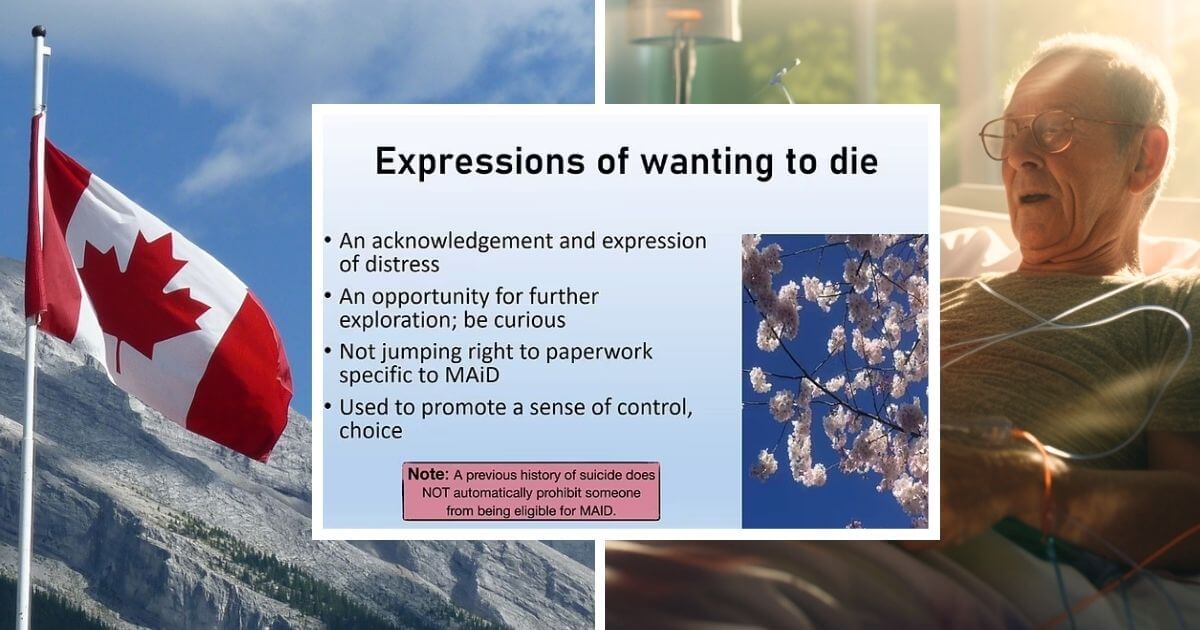A chilling slideshow promoting assisted suicide has caused uproar after being sent to a group of healthy patients in Canada.
One of the largest healthcare providers in the Canadian province of British Columbia, Fraser Health Care, emailed the shocking slideshow to a group of healthy patients as part of the information they were receiving about their pension packages. Images of the slideshow have been obtained with one slide titled “Expressions of wanting to die” claiming that assisted suicide can “promote a sense of control”.
The slideshow, reportedly sent at the end of June, also provides details about the Canadian track system, which offers two pathways for assisted suicide depending on if death is “reasonably foreseeable” or “not reasonably foreseeable”.
Euthanasia to be made legal on mental health grounds
Assisted suicide or euthanasia was made legal in Canada in 2016. The law was amended in March 2021 to permit Medical Assistance in Dying (MAID), as it is known in Canada, in instances where it is not deemed medically necessary, or when death is ‘not reasonably foreseeable’. According to this pathway, introduced in March 2021, a patient with conditions such as fibromyalgia or chronic pain can choose to end their life through MAID.
Now the Canadian government has announced its intentions to expand this provision even further. From March 2024, persons whose “sole underlying medical condition is a mental illness” are set to become eligible for MAID.
“No waiting period” – death within a day
In the slideshow from Fraser Health Care, for those whose death is “reasonably foreseeable”, one slide states that there is “no waiting period” if eligible. Terminally ill patients can be offered a medically assisted death within a day of making a request and being assessed by two independent clinicians.
This slideshow comes as the Canadian government faces backlash after the Special Joint Committee on Medical Assistance in Dying released a report in February that recommends that “the Government of Canada amend the eligibility criteria for MAID … to include minors deemed to have the requisite decision-making capacity upon assessment”.
Veteran asks for chairlift and is offered euthanasia instead
Efforts to expand access to euthanasia come against a backdrop of disturbing stories of people being offered assisted suicide in chilling circumstances.
A Canadian army veteran who competed in the Paralympics in 2016 has told a Government committee that she was offered euthanasia when she asked for a stairlift to be installed in her home.
The retired corporal, Christine Gauthier, who competed in the 2016 Rio de Janeiro Paralympics, testified before a Canadian House of Commons Veterans Affairs Committee at the beginning of December, that an unnamed veterans affairs case worker had said, in writing, that Ms Gauthier could be provided with a euthanasia device when all she had wanted was a stairlift to be installed in her home.
Ms Gauthier, 52, said “I have a letter saying that if you’re so desperate, madam, we can offer you MAID, medical assistance in dying”.
Euthanasia accounted for 3.3% of all deaths in Canada in 2021
According to the latest report on Medical Assistance in Dying (MAID) from Health Canada, 10,064 Canadians ended their lives by assisted suicide or euthanasia in 2021. This figure represents 3.3% of all deaths in Canada and is an increase of 32.4% from the 2020 figures. A total of 31,664 people have ended their lives by assisted suicide or euthanasia in Canada since legislation making it legal was passed in 2016.
Right To Life UK spokesperson Catherine Robinson said “This chilling slideshow demonstrates the ever-expanding reach of assisted suicide in Canada. By promoting such information to healthy patients as part of their pension discussions, health providers attempt to normalise and trivialise a practice that is anything but trivial. It is deeply shocking to see this push for assisted suicide amidst a troubling increase in requests for euthanasia in Canada”.












